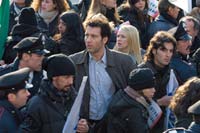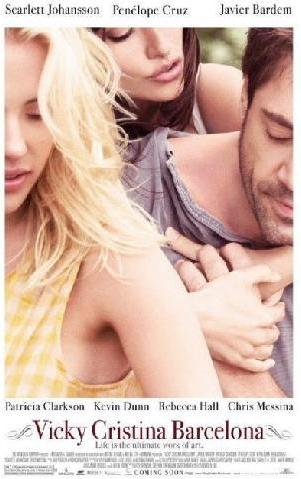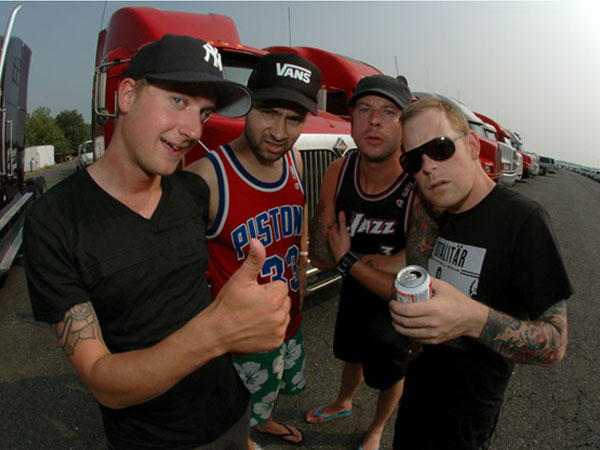February 5th-15th 2009.
by Rita Di Santo
Opening night with THE INTERNATIONAL, by Tom Tykwer [Heaven] who scatters his story across the continent of Europe and leaves poor Clive Owen, as the Interpol agent lost in transaction between insanity and a broken heart, to pick up the pieces.
The International centres on an obsessive Interpol agent (Clive Owen) who spearheads an investigation into one of the world’s most high-profile and powerful banking institutions in an attempt to expose them for illegal arms-dealing, corruption and murder. Naomi Watts is the Manhattan assistant DA who partners him. It’s a glamorous, glossy tour of city squares, cafés, restaurants; an action-thriller that recalls the slick spy stories of the 80’s, but the messy plot is more like a bad version of a Hong-Kong cop flick. Stuck in the middle of the chaos, Clive Owen does his best to enliven proceedings.
FORUM
LOVE EXPOSURE director: Sono Sion
A trashy four hour splatter of romantic soap opera, where anything can happen in the search for love, sex, identity, and fun! This is the kind of uniquely entertaining, and intelligent modern experiment that make the Berlinale Forum so special.
Child abuse, fetishism, extreme religious new age-sects. Sono Sion has never shied away from politically incorrect themes. Wild, baroque and opulent, in ‘Love Exposure’ he choreographs the extremes of human behaviour in an ecstatic passion set to religious music, the Bolero, the Funeral March and the J-Pop of Yura Yura Teikoku. But not all that glitters is camp. Thanks to the candour with which he exposes a ‘love that can overcome all lies.’ The struggle between amor profondo and amor sacro, with a hint of Carmen. Despite its tempestuousness, its provocative content and form (the four-hour running time) the film never loses its tension for a single moment.
Kind-hearted Yu has no choice. His father, a Catholic priest, is urging him to confess, but in order to confess he must sin, and the only sin his cynical father recognizes as such is sexual perversion. So Yu becomes the King of Tokyo’s photo voyeurs – until he meets the Maria of his religious fantasies in the form of schoolgirl Yoko. However, not only does she turn out to be a man-hating rebel, she’s also the stepdaughter of the priest’s lover, and later on she is used as bait by an unscrupulous sect that wants to ensnare the desperate Yu.
Both a love story and a study of friendship: unpretentious, poetic and seemingly effortless, not unlike the feathers almost weightlessly whirling through the air in the closing credits.
DEFAMETION director: : Yoav Shamir
The role of anti-Semitism as an identity issue is the focus of this film. Critics of the Anti-Defamation League question the political dimensions of this premise for Israel’s role and reputation. But Yoav Shamir does not see himself in the role of the slaughterer of a sacred cow. The search for answers and the option of reviewing this highly emotional issue are more important to him than creating new bogeymen. As a young Israeli, he appears like the son posing awkward questions about the beliefs of his parents’ generation. Good parents are happy to engage in a debate with their children.
BERLINALE SPECIAL
TERRA MADRE director: Ermanno Olmi
Ermanno Olmi is without doubt one of the Italy’s greatest directors, and one capable of pushing the boundaries of cinema in fascinating directions. Terra Madre is remarkable proof of an artist who knows how to make technique serve the purposes of art. Ermanno Olmi was in attendance in 2006 and 2008 with several crew members.
“The production of food is being exploited more than ever as a means of exerting power,” says ‘Slow Food’ founder Carlo Petrini. The idea behind the meeting of the ‘Terra Madre’ network is to make food, and those who produce it, a focal point of our lives once more. According to the philosophy of the ‘Slow Food’ organisation, food should taste good, be produced in a clean way and fairly traded. In his film, Ermanno Olmi examines whether ‘Slow Food’ has found an ingenious way of solving such global problems as climate change and starvation. As he puts it: “Perhaps we will one day pass by a garden in which a grandfather and a small girl are harvesting nature‚s ripe fruits. Only then will we recognise the real house of humankind.”
(Thomas Struck)
The cinematography captures all the beauty of nature, with a seemingly infinite and subtle range of light, the Short cut in details clearly catches the light, the atmospheric dust becomes the essential elements of the film. A farmer shows us the seeds of his land, and we can feel the texture, we can see the colour, as if we were there. The documentary opens with footage of the Terra Madre international convention in Turin 2007, studying the faces of the delegates. Everything given a fresh spin; Olmi’s style matching content and form: ‘Slow Food’ considered as a sort of ‘Slow Cinema’, a quiet traditional cinema, preserving the strength of the ages.
A MOVIE TO TASTE !!!
COMPETITION
In the grey routine of the factory, across the noisy machinery, two workers make eye contact and in that instant a fiery, passionate love affair begins. Katie and Paco’s is a magical love. A baby is born: Ricky. No ordinary baby but an angel, with special wings, like those you find on genetically modified chickens in supermarket freezers. French director Ozon cuts a window of fantasy into the brick wall of ordinary life. Surrealistic, colourful, witty, Ozon gives light and freedom to a story of desperation and angst. Is this just a coincidence for director Ozon or is it deliberate? Most likely he’s simply chosen to stay true to his restless, inquisitive desire to explore new territories and styles. Recent European cinema has witnessed a steady stream of films converging in similar realist territory, Ozon likes challenges. As Ozon himself said:
“Its mood reminded me of ROSETTA by the Dardenne brothers. The characters are poor, underprivileged white people living in a trailer park in the heart of the United States. Because of the setting, I wasn’t sure how to approach the story, how to make it mine. And although I like the way an extraordinary, amazing event disrupts the characters’ otherwise bleak existence, the fantasy element frightened me. But then I realised that what touched me about the story wasn’t so much the fantasy element as the way it talks about family, our place in it, and how a new member – a new partner or a new child – can shake up the balance. There’s an irony in Rose Tremain’s writing that corresponds to my own, and I wanted to preserve that in the film. Whenever the story gets too unreal or bizarre, elements of humour and distance come in to release the tension and make the scene work.”
It’s not so much the choice of style or even the story that’s the problem here, but the question of whether an ironic response to “Rosetta” and the Dardenne brothers can really sustain an entire feature film. The cast, though, is remarkable, especially the babies.
LITTLE SOLDIER director: Annette K Olesen
Is it a matter of Dogma for a Danish director to be boring?
More and more it seems Lars Von Trier’s Dogma movement has lost its original meaning and energy. What was once a breath of fresh air in European cinema, now has a rather stale smell about it.
Little Soldier is a poorly-developed tale of misery that collapses under the weight of cliché: an immigrant prostitute has to work to send money home for her baby; Lotte, a veteran of the last Gulf War becomes her driver and bodyguard. After ten minutes, it’s obvious what’s going to happen to Lotte, but we have to wait until almost the end of the movie for the obvious to happen. In the meantime, we follow the prostitute client by client, without a hint of surprise, all we learn is that being a prostitute can be a dangerous job. The trauma of war seems to have left Lotte affectless, either that or the actress has only two facial expressions, which leaves only a small tattoo to indicate what she’s been through, but is a tattoo really enough to talk about the ugly business of the war? And what does the war have to do with the strange business of Lotte father? – a lovely old man, too lovely to be running a prostitution ring. Drab and implausible.




